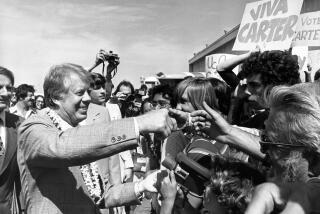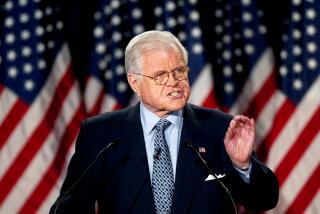When Texan J.J. Pickle Retired, Congress Lost a Connection to History : Politics: Irascible Democrat was a longtime friend of LBJ and of former Gov. John Connally. He was an integral part of nation’s leadership for 50 years.
AUSTIN, Tex. — The year was 1964, and Jake Pickle was attending his first formal Washington party as a newly elected U.S. congressman from Texas.
His pal the President, Lyndon B. Johnson, had insisted that he go.
It was a reception at the Finnish Embassy, and Pickle was being grandly ignored. Finally, he approached the most distinguished-looking man at the party, stuck out his hand and said:
“Howdy, I’m Jake Pickle, congressman from Austin. Who are you?”
“My name is Pierre,” the stranger replied, “and I am your waiter. What would you like to drink?”
Now, three decades and hundreds of such stories later, Johnson’s old crony has called it quits, stripping Congress of its last great link to the LBJ presidency.
Friends in the nation’s capital will remember J. J. (Jake) Pickle for his wondrous sense of history and humor and his treasure trove of LBJ stories.
Now 81, his close ties to the late President date back half a century and flavor a political career that affected the lives of millions of Americans.
History perhaps will remember him as the man who rescued a gravely ill Social Security system or first sounded warnings about the nation’s troubled private pension programs.
As the third-ranking Democrat on the Ways and Means Committee, Pickle involved himself in pivotal tax, trade, economic and health legislation.
But whatever else, his legacy forever will be tinted by his larger-than-life mentor, whom Pickle calls the “most effective President we’ve ever had.”
Back home, Pickle spun a few of his yarns at a recent reception for Friends of the LBJ Library. The next day he was all aglow at the dedication of the J. J. Pickle Research Campus at his beloved University of Texas.
Before and after, he spoke with wit and warmth of Johnson and the late Texas Gov. John Connally, a longtime friend, and of his legendary Texas colleagues in the U.S. Congress.
James Jarrell (Jake) Pickle arrived on the Washington scene in one of the nation’s darkest hours and left after a nasty election that “turned the political world upside down.”
Actually, Pickle’s 10th District was secure. So much so that Democrat Lloyd Doggett captured the seat rather handily while voters were zapping other Democrats in Texas and around the nation.
Republicans seized control of the House for the first time in 40 years, and among the casualties was Pickle’s buddy Jack Brooks, the state’s senior House member.
About the election, Pickle said: “This was a shocker. . . . It’s unfair to the Democrats. They lost for the wrong reason.”
Although economic conditions are good, he said, opponents set out a year ago to “malign and defame” President Clinton, making him appear ineffective and the government out of control.
Worse yet, he said, he and his own party members did little to help.
“The people distrust their government. . . . The political atmosphere was getting too charged, too far to the right, and almost as bad as the day before JFK was assassinated.”
Jake Pickle’s ties to LBJ date back to the 1940s.
“I was one of the early, youngest LBJ boys,” he said. “Now I’m the oldest LBJ boy . . . and one of the last.”
Pickle worked in Johnson’s U.S. House and Senate campaigns and served on his staff in Austin and Washington before winning Johnson’s old seat in a special election.
That was Dec. 17, 1963, less than a month after an assassin’s bullets killed President John F. Kennedy, wounded Connally and launched Johnson into the White House.
A week after Pickle was elected to Congress, Johnson summoned him to Washington and got him sworn in at dawn on Christmas Eve. The President needed his vote on a bill to sell wheat to Russia.
“Boys,” Pickle recalls the President telling congressmen, “you ain’t going home for Christmas until you pass this bill.”
It passed.
And Jake Pickle, the newest member of Congress, flew home for the holidays aboard Air Force One.
In time, Pickle began referring to LBJ, a native of the Texas Hill Country, as “my constituent.”
Smiling, Pickle said: “Lyndon didn’t think that was very funny.”
Pickle was born in the West Texas town of Roscoe in 1913, grew up in Big Spring during the Great Depression and, with $60 in his pocket, entered the University of Texas in 1932.
An aspiring lawyer, he supported himself by sweeping floors and waiting tables, even selling milk.
Although he soon abandoned law, his pals in the Delta Theta Phi legal fraternity included future governors Allan Shivers and Connally and a future congressman, Joe Kilgore.
All were active in campus politics. Pickle, Shivers and Connally were elected student body presidents.
Pickle met Johnson through Connally, who worked for Johnson, then a newly elected congressman. In 1941, Pickle signed on to work in Johnson’s campaign to fill a vacant Senate seat.
Johnson lost, but voters remembered his stirring campaign promise:
“If I ever send our men into conflict, that day I am going to leave my seat in the Congress and go with them.”
Pickle said with a chuckle: “I don’t think he was really too happy later that he said that.”
When the Japanese bombed Pearl Harbor, Johnson had little choice. He joined the Navy, but left Pickle behind to organize a petition drive urging him to seek reelection to his House seat.
“I got 30,000 signatures in three months,” he said.
Thus, Pickle found himself headed to Washington in early 1942 to help Lady Bird Johnson run her husband’s congressional office.
“Lyndon forgot to tell me that he didn’t have any money to pay me,” he said.
Pickle soon was working in Johnson’s office by day and as a Capitol cop by night. Changing into a uniform, he stood vigil most evenings armed with a typewriter and handling office correspondence.
“I was a poor Capitol policeman,” Pickle laughed. “I probably was the worst they ever had.”
He was so bad, in fact, that he got fired.
Mrs. Johnson intervened, calling his boss and saying, in Pickle’s words:
“You just must not let deah Mr. Pickle go. Lyndon is out in the Pacific fightin’ the wah, and Ah need to keep him on the staff.”
They hired him back.
Whether out of a sense of duty, or just to escape those 16-hour work days, Pickle went to war in the summer of 1942. He spent 3 1/2 years in the Navy and saw action in nine battles at sea.
When World War II ended, he returned to Austin and, with Connally and several other veterans, established Austin’s second radio station, KVET.
Austin’s first station, of course, was KLBJ, owned by the Johnson family.
In 1948, Pickle helped orchestrate Johnson’s U.S. Senate victory over Coke Stevenson, an infamous 87-vote affair that earned his mentor the sardonic nickname “Landslide Lyndon.”
As LBJ shinnied up the Senate seniority ladder to majority leader, Pickle was back home in the ‘50s and mixed up in factional bloodletting inside the Texas Democratic Party.
The opposition liberal wing wanted its fund-raising proceeds earmarked for the national party, not the state party, and adopted the slogan: “Dollars for Democrats but not a Nickel for Pickle.”
In 1963, Homer Thornberry, who held LBJ’s former seat in the U.S. House for 13 years, was appointed a federal judge, and Pickle entered the race to succeed him.
He wasted no time capitalizing on his name, with young supporters called “gherkins,” Hispanics forming a “Viva Pepino” organization and Pickle himself handing out plastic pickles.
Years later, he told an Associated Press reporter:
“My campaign is one-to-one, person-to-person. I pass out as many pickles today as I did 25 years ago. They’re squeaker pickles now, the size of a dill. I have to have a sack to carry them.
“I look like a man with his saddlebags on during a parade.”
After the Kennedy shooting in Dallas in 1963, Pickle was a shoo-in, and through 15 subsequent campaigns his grip on the once-sprawling, now-compact 10th District never lessened.
Still, he remembers his first view of the Sam Rayburn Office Building.
Rep. Frank Ikard, a fellow Texan, drove him to the Capitol that day and pointed out the building, which was not yet finished. Jake peered through the rain and mist.
“It doesn’t look so hot to me,” he shrugged.
Ikard, with a sly grin, explained that the granite siding was from Marble Falls in his 10th Congressional District.
“You know,” drawled Jake, “the closer you get, the prettier it looks.”
More to Read
Get the L.A. Times Politics newsletter
Deeply reported insights into legislation, politics and policy from Sacramento, Washington and beyond. In your inbox three times per week.
You may occasionally receive promotional content from the Los Angeles Times.










